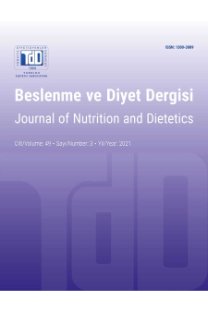Akciğer Kanserli Erişkin Bir Olguda Nutrisyonel Uygulamalar
Akciğer kanseri genellikle semptom vermeden ileri evrede tanındığı için hastalıklar içerisinde talihsiz seyre sahip olanlardandır. Tedavi seçenekleri arasında cerrahi, kemoterapi, radyoterapi veya bunların birlikte kullanımı yer alır. Uygulanan medikal tedavi hastaların oral yoldan aldıkları besin miktarını dramatik bir şekilde azaltabilir. İstemsiz ağırlık kaybı, ileri evre kanserde erken ölümün bağımsız bir göstergesidir ve kötü sağlık belirtecidir. Tıbbi beslenme tedavisine sıklıkla kanser tedavisinin yol açtığı bulantı, kusma, erken doygunluk hissi, ağız kuruluğu, tat alamama, ishal ve kabızlık gibi yan etkiler nedeniyle gereksinim duyulur. Bu yazıda akciğer kanserli bir olguda kemoterapi sürecinde yaşanan semptomlar ve beslenme stratejileri kaynaklar eşliğinde tartışılmıştır.
Nutritional Practices in a Case with Lung Cancer
Lung cancer is an unfortunate disease particularly in that it is often diagnosed in advanced stage with no prior symptoms. Treatment includes surgery, chemotherapy, radiation, or a combination of these. Patients oral food consumption decreases dramatically because of medical treatment. Unintentional weight loss is recognized as an independent predictor of poor health and earlier death in advanced cancer. Medical nutrition therapy is often required for nutrition-related side effects of cancer treatment, which included nausea, vomiting, early satiety, xerostomia, dysgeusia, diarrhea, and constipation. In this case report we discussed via a case experienced symptoms and nutritional strategies in chemotherapy period.
___
- 1.Jemal A, Bray F, Center MM, Ferlay J, Ward E, Forman D. Global cancer statistics. CA: a cancer journal for clinicians. 2011;61(2):69-90.
- 2.Göksel T, Yıldız P, Altın S, Başer S, Bayız H, Görgüner M, et al. Akciğer kanseri. Türkiyede Temel Akciğer Sağlığı Sorunları ve Çözüm ÖnerileriBeyaz Kitap. Türk Toraks Derneği Yayınları. Sentez Matbaacılık ve Yayıncılık, Ankara, 2010:55-70.
- 3.Travis WD, Brambilla E, Noguchi M, Nicholson AG, Geisinger K, Yatabe Y, et al. International Association for the Study of Lung Cancer/American Thoracic Society/European Respiratory Society: international multidisciplinary classification of lung adenocarcinoma: executive summary. Proc Am Thorac Soc 2011;8(5):381-385.
- 4.Alberg AJ, Ford JG, Samet JM, American College of Chest Physicians. Epidemiology of lung cancer: ACCP evidence-based clinical practice guidelines (2nd edition). Chest 2007;132(3 Suppl):29S-55S.
- 5.Campporeale JM, Roberts S. Clinical Nutrition for Oncology Patients. (Ed:Marian M, Roberts S), Jones and Barlett Publishers; Sudbury, 2010.
- 6.McErlean A, Ginsberg MS. Epidemiology of lung cancer. Semin Roentgenol 2011;46(3):173-177.
- 7.Cranganu A, Camporeale J. Nutrition aspects of lung cancer. Nutr Clin Pract 2009;24(6):688-700.
- 8.The Alpha-Tocopherol, Beta Carotene Cancer Prevention Study Group. The effect of vitamin E and beta carotene on the incidence of lung cancer and other cancers in male smokers. New Eng J Med 1994;330(15):1029-1035.
- 9.Goodman GE, Omenn GS, Thornquist MD, Lund B, Metch B, Gylys-Colwell I. The Carotene and Retinol Efficacy Trial (CARET) to prevent lung cancer in high- risk populations: pilot study with cigarette smokers. Cancer Epidemiol Biomarkers Prev 1993;2(4):389-396.
- 10.Dewys WD, Begg C, Lavin PT, Band PR, Bennett JM, Bertino JR, et al. Prognostic effect of weight loss prior to chemotherapy in cancer patients. Eastern Cooperative Oncology Group. Am J Med 1980;69(4):491-497.
- 11.Tewari N, Martin-Ucar AE, Black E, Beggs L, Beggs FD, Duffy JP, et al. Nutritional status affects long term survival after lobectomy for lung cancer. Lung Cancer 2007;57(3):389-394.
- 12.Arends J, Bodoky G, Bozzetti F, Fearon K, Muscaritoli M, Selga G, et al. ESPEN Guidelines on Enteral Nutrition: Non-surgical oncology. Clin Nutr 2006;25(2):245-259.
- 13.Bergman E, Buergel N. Nutrition Therapy and Pathophysiology. (Ed: Nelms M, Sucher K, Long S). Thomson Higher Learning; USA, 2007.
- 14.Murphy RA, Mourtzakis M, Chu QS, Baracos VE, Reiman T, Mazurak VC. Nutritional intervention with fish oil provides a benefit over standard of care for weight and skeletal muscle mass in patients with nonsmall cell lung cancer receiving chemotherapy. Cancer 2011;117:17751782.
- 15.van der Meij BS, Langius JA, Smit EF, Spreeuwenber MD, von Blomberg BM, Heijboer AC, et al. Oral nutritional supplements containing (n-3) polyunsaturated fatty acids affect the nutritional status of patients with stage iii non-small cell lung cancer during multimodality treatment. J Nutr 2010;140:1774 1780.
- 16.Payne C, Larkin PJ, McIlfatrick S, Dunwoody L, Gracey JH. Exercise and nutrition interventions in advanced lung cancer: a systematic review. Curr Oncol 2013;20(4):e321-337.
- 17.Evans WK, Makuch R, Clamon GH, Feld R, Weiner RS, Moran E, Blum R, et al. Limited impact of total parenteral nutrition on nutritional status during treatment for small cell lung cancer. Cancer Res. 1985 Jul;45(7):3347-3353.
- 18.American Diabetes Association. Standards of medical care in diabetes-2013. Diab Care 2013;36(Suppl1):S11-66.
- ISSN: 1300-3089
- Yayın Aralığı: Yılda 3 Sayı
- Başlangıç: 1972
- Yayıncı: Türkiye Diyestisyenler Derneği
Sayıdaki Diğer Makaleler
Adolesan Yüzücülerin Antrenman Sırasında Sıvı Kayıplarının Değerlendirilmesi
Nesli ERSOY, Deniz ER, Taner ÖZGÜRTAŞ
Kız Üniversite Öğrencilerinde Yeme Tutumunun Kişisel Beden İmajı Algısı ile İlişkisi
Damla YILMAZ, AYLİN AYAZ, Zehra DEMİREL BÜYÜKTUNCER
Olgu Sunumları Işığında Enerji İçecekleri ve Olası Sağlık Etkileri
Obez Kadınlarda Davranışsal Tedavinin Beslenme Davranışına Etkisi
